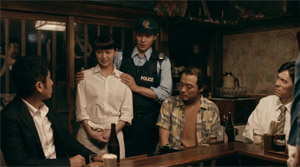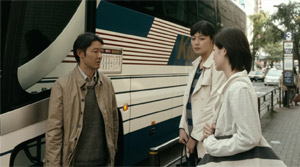

Shinya Shokudo
Japan 2015
Genre:
Drama
Director:
Joji Matsuoka
Cast:
Kaoru Kobayashi
Mikako Tabe
Michitaka Tsutsui
Akiko Kikuchi
Joe Odagiri
Sei Matobu
Mansaku Fuwa
Kimiko Yo
Shohei Uno
Saki Takaoka
Tokio Emoto
Risa Sudo
Asako Kobayashi
Nahoko Yoshimoto

Midnight Diner

Story: When others finally go home, a restaurant owner, who is simply known under his name "Master" (Kaoru Kobayashi), just starts his work.
You could think that there is not much happening in his restaurant in the time between midnight and 7 o'clock, but you're wrong. Not only does Master have a
big amount of regulars, they also tell him of their problems. There is generally a very cordial atmosphere at the restaurant. However, one day someone
leaves an urn at Master's place. When after quite a while no one has contacted him, yet, Master takes the urn to police officer Kogure (Joe Odagiri), who then
files a missing person case. But even after that no one is contacting Master. At the same time he can't cook that well anymore, because he is plagued by pain in
his hand. Just at that time the girl Michiru (Mikako Tabe) turns up at his place, eats and vanishes without having paid. Shortly after that she turns up again,
apologizing and wanting to work for her meal. Michiru obviously doesn't have a home to stay and so Master lets her live at the restaurant for a while. She works
and proves to be talented, but she knows that her employment is only for a short period and so she has to think about what to do in her future. The regulars at
the diner help her with that.





Review: "Midnight Diner" is one of those films that feel like making a trip back home. Where the pacing of everyday life is a bit slower
and you can meet with well familiar faces in a cozy atmosphere to share some stories. Accordingly, this drama based on a manga by Yaro Abe manages to create a
pleasant feeling within the viewer, especially since the problems depicted aren't suffocating at all times and are brought to a satisfying conclusion at which end
you will always feel soothed by a feeling of peace. Yet, "Midnight Diner" struggles with a few issues. The slow pacing interestingly enough isn't one of them,
though, but mainly the fact that the movie is structured in an episodic way. This leads to no focal point being apparent and the film feeling torn apart in
general.

This mainly concerns the second half of the flick, however. During the first part we are introduced to Master and his regulars. What direction the movie is
heading towards concerning its story isn't clear yet, but as an introduction you are instantly drawn into the cozy atmosphere of the diner and also become
familiar with the numerous regulars who all stand as colorful individuals. What's also appealing is that Master seemingly is the actual protagonist, but
still always remains in the background somehow. In the first story, which seamlessly follows the introduction, this fits pretty well. Master accepts Michiru as
his student and through his goodnatured but not implausibly self-sacrificing actions - after all, he sends his student away when he believes that she can
stand on her own two feet - we see what kind of a person he is.

After this story it actually starts to dawn on us that this is an episodic movie. The stories are also presented with their respective titles named after
dishes, but the second story features an unneeded breach in continuity. Master is shoved into the background and merely acts as a guy lending his patient ear
with which he listens to his guests and their problems. This is repeated so often that it even becomes a caricature. At least he doesn't throw around pieces
of wisdom which would have made the movie look hackneyed. Instead, Master's actions remain subtle which forces us to interpret things. There are still some
questions that remain unanswered. One of the most important ones being about Master's past since there is a giant scar going across his face. But those unanswered
questions really fit the film well. It's just a shame that we barely get to see anything from Master in the second half.

Because of this the movie loses its gravitational centre. The unfortunate love story strays off way too far into the open and is barely anchored in the rest
of the story. This is worsened by the fact that the second story also revolves around earthquake victims and therefore seems to come across as socio-critical.
Unfortunately, this is implemented way too heavy-handedly and clearly shows that "Midnight Diner" works out best when it approaches things subtly and
takes care of the small problems of people and the place that women have in Japanese society. So sadly you will lose interest in the events at the latest
during the final 40 minutes of the movie and will only wake up again when we sit at the counter of the diner and get to see the characters we have grown
fond of. The potential of the characters is big. The more questionable is the decision to choose completely different ones for the second story to whom we
have no emotional bond whatsoever.





Acting-wise Kaoru Kobayashi ("Boys on the Run") manages to bestow the necessary kindheartedness and mysteriousness upon his role, Mikako Tabe ("Fish Story") on the other hand manages to bring to screen her growing as a human being in a credible manner. Next to those two there are also some very queer characters to be seen, of which the police officer, played by Joe Odagiri ("My Way"), remains the most memorable one. Next to the pictures, which are nice to look at but are composed in a restrained fashion, there is also a pleasant soundtrack capable of carrying the feel-good atmosphere of the diner as a place of refuge when facing the problems of the world. Director Joji Matsuoka has also shot the tv show of the same name and it also shouldn't come as a surprise that even a sequel is in post-production. "Midnight Diner" is an exquisitely pleasant film, but better hit the stop button before the second story pulls the movie down in terms of quality.

Disclaimer










